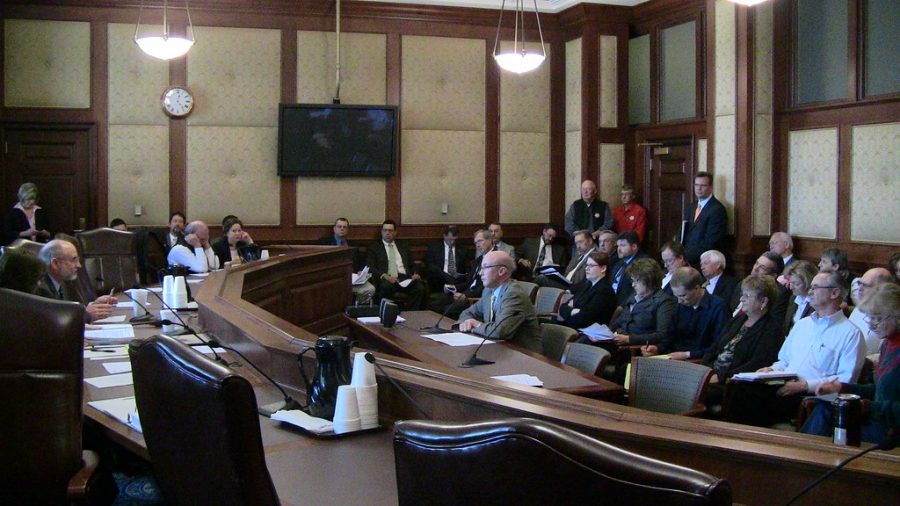Will the Senate Confirm Trump’s Pick for Supreme Court Justice?
We are living during the most partisan times in recent history. President Trump announced his Supreme Court nomination to replace the late Justice Ginsburg, Judge Amy Coney Barrett, with fewer than 40 days until the election. Now, there is a contentious battle as the nomination process unfolds with an October Surprise that no one expected in hand. Democrats will attempt to slow down the process as Republicans urgently work to speed it up.
Senate Majority Leader Mitch McConnell and the Senate Republicans have wasted little time since the announcement of RBG’s death on September 18th. The Constitution gives the President the power to nominate someone for the position. This person must then be voted upon by The Senate Judiciary Committee which holds hearings and votes on whether to send the nomination to the full Senate for approval. A nominee used to need 60 votes to be confirmed, but this was lowered to 51 by Republicans who currently hold a slim majority. This means The GOP can potentially lose 3 votes on the floor and still have their nominee confirmed with Vice President Mike Pence breaking the tie, as prescribed in the Senate rules “The Senate has more than sufficient time to process a nomination,” McConnell said while attempting to debunk a litany of liberal concerns on the Senate floor. “History and precedent make that perfectly clear.”
The Senate is currently split 53-47–including independents Angus King of Maine, and Bernie Sanders of Vermont who caucus with the Democrats–with a Republican majority. Four GOP Senators would need to abstain or vote against the nominee in order to block the nomination, which seems unlikely. Nonetheless, two GOP senators, Linda Murkowski (AK) and Susan Collins(ME) have already released statements indicating that they will abstain from voting prior to the election.

A third Republican, Mitt Romney (UT), whom liberals’ hoped might also abstain has recently announced that he will vote in the confirmation hearings, saying “If the nominee reaches the Senate floor, then I intend to vote based upon their qualifications.” At this point, it seems likely that Romney will vote in favor of Coney Barrett.
Senate Minority Leader Chuck Schumer (D, NY) pointed out the stark contrast between what Republicans said after 2016 after the death of Justice Scalia and what they are pushing now. He quoted Senator Lindsey Graham (R, SC) saying, “I want you to use my words against me. If there’s a Republican president in 2016 and a vacancy occurs in the last year of his first term, you can say Lindsey Graham said let’s let the next president, whoever it might be, make the nomination.” Schumer articulated that there is a moral imperative to stand by your words and honor the late Ginsburg’s dying wish. Instead, the GOP has done the opposite. President Trump has even falsely claimed her wish was “fabricated” by Democratic leaders.
Schumer also pressed the urgency of the matter, saying “This vacancy on the Supreme Court puts everything on the line.” He claimed that Mr. McConnell and the Senate Republicans’ desire to rush through confirmation hearings was a “brazen power play” and vowed to do everything in his power to slow down the process.
Although there seems little to be done, Democrats do have a few viable options to slow down the process which will begin the week of October 12th but could potentially be pushed to the lame-duck session. The most notable would be Schumer’s ability under Senate rules to postpone the hearing by a week. Such a delay would essentially defer the inevitable because even if Trump loses the election, he and the Senate would still have almost three months to complete the confirmation process. The filibuster, a tactic that is used to delay or prevent progress in a session was removed from Supreme Court hearings after Neil Gorsuch’s confirmation in 2017 by Senate Republicans.
Senate Democrats still have a chance if Senator Martha McSally(R-AR) loses her seat in a special election to former astronaut, Captain Mark Kelly. Kelly could be sworn in by late November garnering the Democrats another vote. This seems plausible as Kelly is holding a marginal lead over McSally in recent polling and is said to be “the clear favorite” according to pollsters at the state and national level.
With the tweeted announcement Friday that President Trump and his wife have COVID-19 others in his inner circle have begun to test positive as well revealing an interesting October Surprise. Three GOP Senators, Thom Tillis(R-NC), Mike Lee(R-UT), and Ron Johnson(R-WI) have all tested positive for the virus. Both Tillis and Lee are majority members of the Judiciary Committee and in their absence would decrease the Republican majority.
On Saturday Mr. McConnell announced that he will postpone Senate floor activity, but move forward with the confirmation hearings for Coney Barrett. He stated, “The Senate Judiciary Committee will convene on October 12th as Chairman Graham has scheduled to begin confirmation hearings for Judge Amy Coney Barrett’s nomination to the Supreme Court.” All hearings will seem to continue in a hybrid model which will allow both Lee and Tillis to participate much to the discontent of Senate Democrats.
Mr. Schumer tweeted, “We now have two members of the Senate Judiciary Committee who have tested positive for COVID, and there may be more. I wish my colleagues well. It is irresponsible and dangerous to move forward with a hearing there is absolutely no good reason to do so.” There is an obvious concern to hold these hearings in-person with a new uptick of cases surrounding the GOP and the White House. It is unclear to what extent the virus can potentially have on the confirmation of Coney Barrett, however, the adapted virtual model implies that Senate Republicans will move with little delay after the confirmation from the Judiciary Committee.
There is no downplaying how critical this nomination is to both sides. For the GOP, it serves as a defining moment in conservative politics that will grant them a six to three majority in the Supreme Court, and power for years to come. Democrats warn that this power could lead to overturning rulings such as Roe v Wade and declaring legislation such as the Affordable Care Act unconstitutional. There is little doubt that Judge Coney Barret will be approved; it would be naive to think otherwise. However, although small there remains a sliver of hope for Democrats if the cards are dealt in their favor.

After joining The Advocate in her sophomore year, Mireya quickly fell in love with journalism, storytelling, and the community that is created and engaged...












